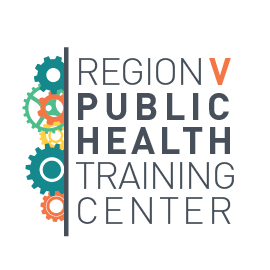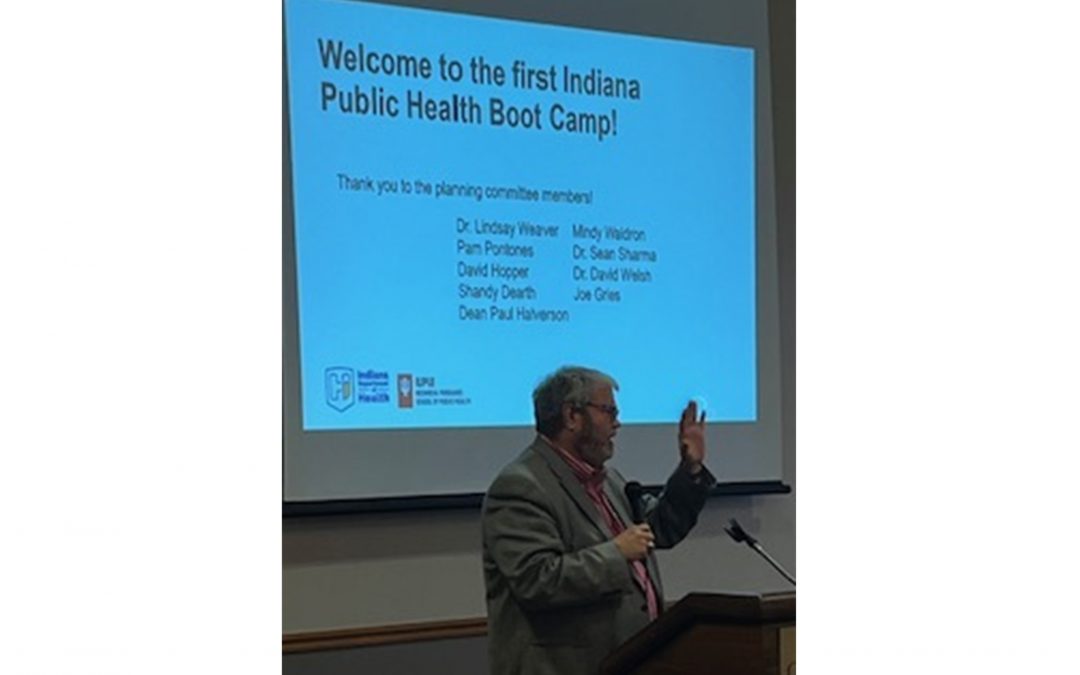By Shandy Dearth, MPH, Fairbanks School of Public Health at Indiana University Indianapolis
In April 2023, the Indiana General Assembly passed Senate Enrolled Act 4, which included a requirement for new health officers to complete a foundational public health training. The Indiana Department of Health (IDOH) contracted with the Indiana University Fairbanks School of Public Health (FSPH) to manage the logistics and development of this training. In addition to new local health officers, seasoned local health officers and local health department (LHD) administrators were also invited to the training since they are often the full-time directors of LHDs. In Indiana, many health officers often fulfill their roles on a part-time basis while still practicing medicine in their full-time roles, while the administrators handle the daily operations of the health departments. It is important for both roles to have a clear understanding of the responsibilities of the other person, so hosting an inclusive training opportunity was a priority for this group.
FSPH formed a planning team that included members of the state health department and various local health departments, including health officers and LHD administrators. This team met regularly and planned three trainings referred to as ”Public Health Boot Camps” that were designed to integrate both educational and networking opportunities. The team offered training topics and helped to identify speakers for each session as well as their location. While public health staff across the country became proficient at online meetings during the pandemic, the planning group strongly believed in the value of having people physically together in the same room for stronger networking and learning opportunities. The camps were held in three different sites around the state (one central, one northern, and one southern) so the LHD staff did not need to travel to Indianapolis where both FSPH and IDOH are located. The presentations were not recorded during the camps but are being recorded via a Zoom session with FSPH so the material may be shared in the future with LHDs. These will be shared on the State’s SharePoint site, which is accessible to all local health departments.
The overall goal of the boot camp was to give LHDs proven leadership tools and resources they need as they build and expand their capabilities with this new funding allocated to them in the last legislative session.
The first day of the boot camp started with a dinner and opening welcome from the State Health Commissioner along with presentations on working with elected officials and the media. Hotel rooms were covered at the location with funding for the attendees who chose to stay on location rather than travel back and forth for the two days. Those who stayed at the venues expressed gratitude in having that as an option and the planners will offer rooms again in future camps, to facilitate the ease of attending the camps by lessening the burden on the LHD staff.
The second day of the camp included presentations on financing, epidemiology and reporting requirements, IDOH resources, national public health resources, and emergency preparedness. Each session was interactive and engaged public health professionals from both the LHDs and the state health department. Attendees were given a pre- and post-test ‘quiz’ to determine if the content increased participants’ understanding of the material presented.
All attendees were also sent an overall evaluation of the boot camps. The vast majority of participants reported gaining knowledge during the boot camps and want to continue participation in future years. Respondents offered suggestions for the 2024 boot camps that covered topics such as:
- Health department accreditation
- Maternal/fetal health
- Environmental health
- More conversation focusing on what counties are doing to meet the key performance indicators, a new process LHDss are following to report on the progress on the new state funding allocated to public health
- Gray areas that don’t have statutes, but that LHDs still have to handle
- A separate breakout where health officers could have a round table discussion, perhaps facilitated by staff
- Emergency response, specifically a tabletop emergency response exercise to a train derailment.
- How to mine county-level statistics
- Public health finance (insurance billing, contracts for sub-grantee work)
- Employee engagement and retention
- Communication policies (social media, websites, internal/external)
- Unique challenges for rural health departments
Materials from these trainings are being uploaded into the IDOH SharePoint site, which is accessible to LHDs. The State is aspiring to build a repository of documentation and trainings that are helpful to LHD leaders and staff as all levels of government work towards building a healthier state.
To learn more, check out this resource:

